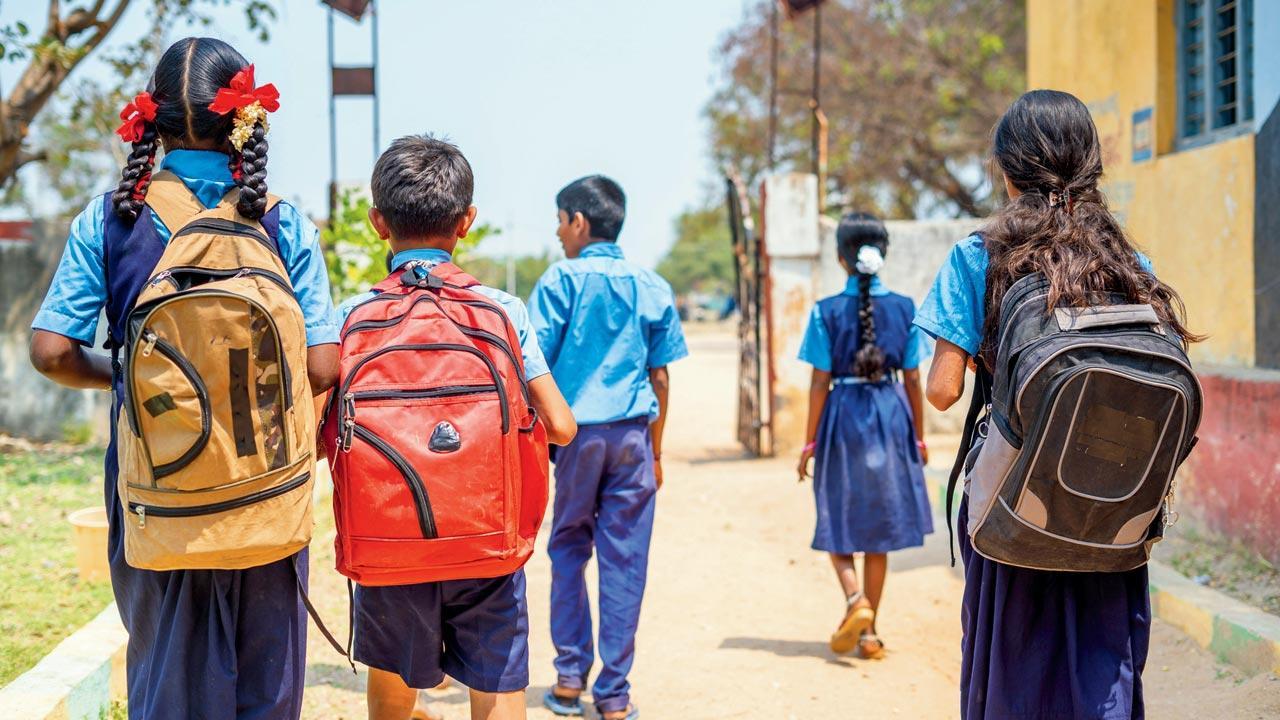As the ministry drafts new guidelines, parents and educators weigh in on the effectiveness of the proposed policy

Heavy school bags are a source of physical stress for children. Representation pic
In a bid to alleviate the burden of heavy school bags, the Union government is considering making 10 “bagless” days mandatory each year. Following a meeting on July 10, the Union Ministry of School Education has established a team to draft guidelines for this initiative.
While the Union Ministry of Education is considering making the “No Bags Day” policy mandatory for all schools across the country. This initiative, proposing 10 bagless days per year, aims to address the persistent issue of heavy school bags. But is this measure sufficient? How are schools currently managing this challenge?
mid-day spoke with parents, school officials, and other stakeholders to gather their opinions on the proposed policy and get a clearer picture of the policy’s potential impact and effectiveness in alleviating the burden on students.
NEP meeting
On July 10, Union Education Minister, Dharmendra Pradhan, led a meeting in Delhi to discuss the National Education Policy (NEP) and upcoming educational strategies for the next five years. He emphasised the importance of a “unified education system” between state and central governments to enhance educational standards nationwide, stating that education is a “fundamental pillar” of Prime Minister Modi’s vision for a developed India.
Pradhan called for collective efforts to advance education, noting that the NEP has already improved the country’s educational landscape. He highlighted India’s responsibility as a young nation to foster good citizenship through education and stressed the need for a modern system focused on technology and skill development to enhance employment opportunities.
Minister of State Jayant Chaudhary supported Pradhan’s perspective, describing the 2020 Education Policy as a significant step towards progress.
Reducing the burden
The Union Ministry of Education is preparing guidelines for the concept of bagless days in schools. This concept is expected to be implemented nationwide soon. On these days, students will be taken on field visits outside the school premises. They will learn practical skills such as identifying clean water, studying local plants and animals, and visiting local monuments etc.
Initiatives in Maharashtra
Heavy school backpacks are a persistent source of physical stress for children. Despite efforts by education authorities to reduce their weight, the issue remains. Courts have mandated that state governments create policies to limit heavy bags, and committees have been formed to tackle the problem.
Many see the “No Bags Day” policy as a promising solution. Schools are encouraged to implement innovative strategies that promote healthier learning environments. These initiatives can transform traditional education, offering engaging, hands-on experiences while alleviating the burden of heavy backpacks.
Arundhati Chavan, president of the Parent Teachers Association United Forum, highlighted the persistent problem of heavy school bags, which cause pain in students’ lower backs, shoulders, and hands. “These pains are often misunderstood as growing pains or poor posture. We need alternative learning activities like quizzes, group discussions, and special reading sessions to foster better use of library resources and alleviate the burden of heavy bags.”
Kalpana Patange, Principal of Jamnabai Narsee School, shared insights into her school’s innovative curriculum designed to offer rich learning experiences without the reliance on heavy textbooks.
“Project presentations, known as Gyan Manthan, are a highlight of each class. Other opportunities include art and astronomy workshops, leadership camps, festival celebrations, Model United Nations, field trips, and a week-long annual program featuring performing arts and sports. We prioritise experiential learning, which leads to meaningful growth, with some activities also serving as assessment tools. Parents are invited to participate and observe their children’s progress, and students particularly enjoy activity-based learning,” she said.
Sharing initiatives taken to reduce school bag weight in his school, Hanif Kanjer, Director of Rustomjee Cambridge School, said, “This academic year, starting in June, our IGCSE school introduced a bi-monthly note-cum-workbook for nursery and kindergarten, allowing students to use a single book for two months. This simplifies parent involvement and reduces school bag weight. Following a successful pilot, we’ll expand this next year.”
“We’ve also added drop-off tubs in the lobby for sports kits. For grades three to eight, textbooks and notebooks are integrated; for example, grade eight math books (700-800 pages) will be split into three parts. Additionally, two periods are dedicated to design and technology, eliminating the need for extra books,” he added.
 Subscribe today by clicking the link and stay updated with the latest news!" Click here!
Subscribe today by clicking the link and stay updated with the latest news!" Click here!










